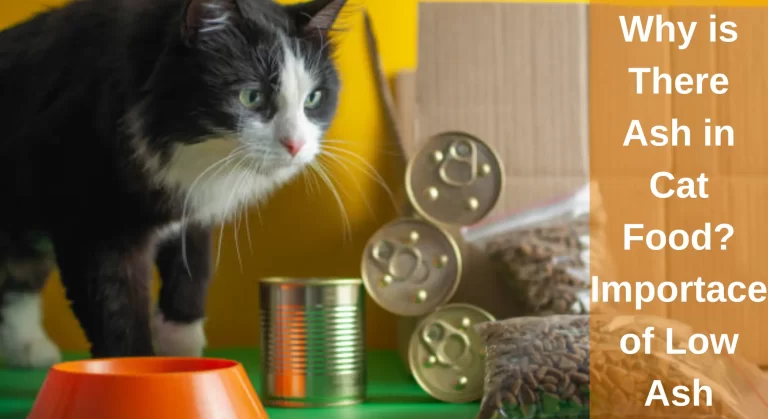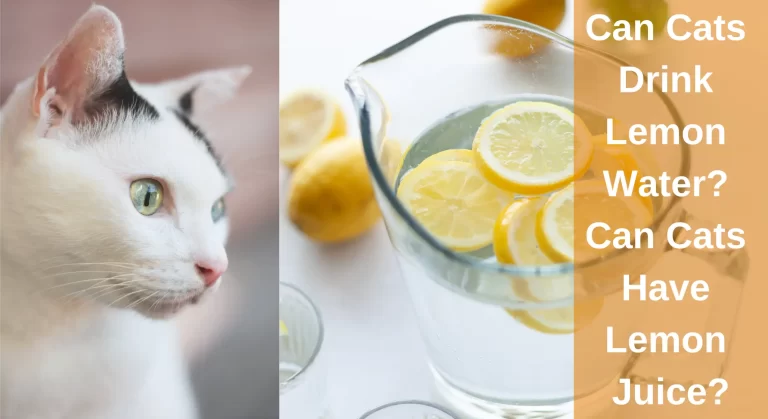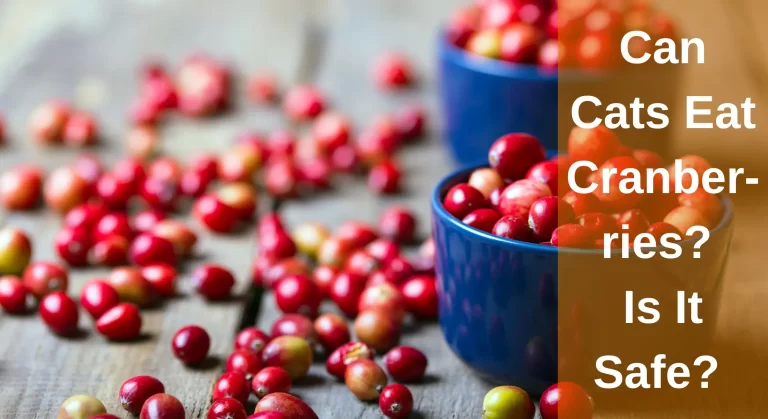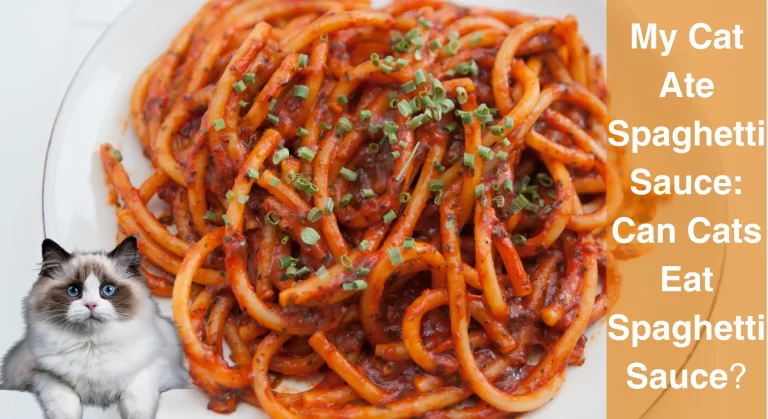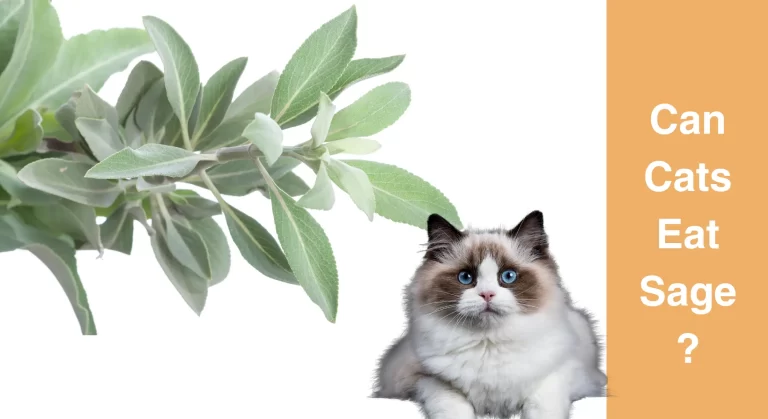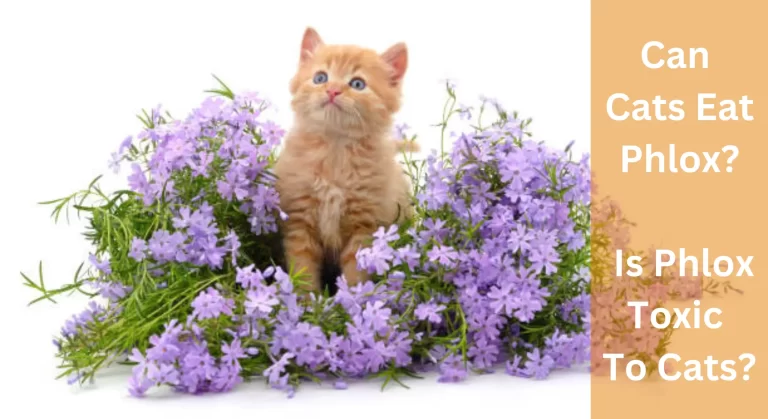Can Cats Eat Human Food? List of Human Foods That Cats Can and Cannot Eat
Over the years, many cat owners have questioned me, “Can cats eat human food?” My cat begs me for food all the time! So, may I eat with her and do so without being afraid? Unfortunately, there is no quick fix. Remember, just because a food is suitable for us doesn’t necessarily mean it is safe for them.
While certain human foods are lethal to cats, others are harmless. However, as long as it is not habitual, your cat may eat the majority of the food that people eat. For instance, a delicious, well-cooked piece of deboned beef, salmon, turkey or a banana that we could serve in little bits for dessert is just as healthy for cats as they are for people.
Of course, the aforementioned question prompts other questions: If my cat can only eat some of what we eat, what human foods can I give them? Can cats eat any type of food? Which human foods, specifically, are dangerous to my cat?
We will discuss how to feed our cats a balanced diet to ensure that they lead as healthy and fulfilling lives as possible.
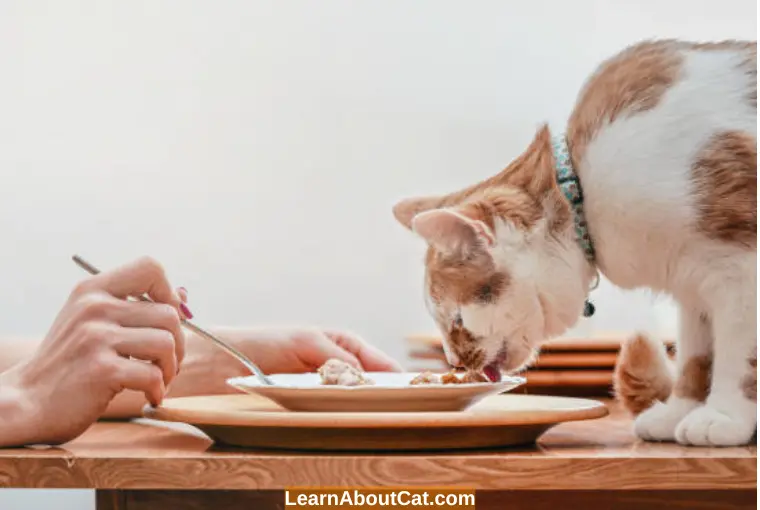
What Should be on the Ideal Diet Plan for a Cat?
Vitamins (A, B complex, D, E, and K) Vitamin A, in particular, is necessary for your cat’s body to produce new cells. Due to their inability to produce it, cats need vitamin A more than any other vitamin.
Proteins and Amino acids: As their main food source, meat provides cats with all the protein they need. A cat’s diet has to contain food from the meat group, which includes meat, fish, and chicken.
Taurine is necessary for the hormonal system, tissue development and repair, along with other amino acids like niacin. Cats that don’t get enough taurine can suffer serious health problems in a number of organs, including the heart and eyes.
Micronutrients, including calcium, phosphorus, iodine, and selenium, are crucial for developing a cat’s bones and oral health. Because of them, her hormonal system and metabolism both function regularly. A cat’s health may suffer from a shortage of any micronutrient in the food, even if a large consumption is not required.
A cat’s diet low in fibre might result in constipation, a severe digestive problem. Cooked vegetables and grains contain a lot of fibre. However, consuming too much fibre has its risks. Fibre holds onto water, which might result in watery faeces in your cat. Finding the right balance is necessary for a healthy digestive system.
Fats: A cat’s sustained health depends on fats as a source of energy. Although this macronutrient is included in certain human meals—such as those that include almonds and avocados—fats are mostly obtained through the meat. Over time, weight gain and obesity can result from a high-fat diet. These two factors increase the probability of getting a multitude of diseases, including diabetes and heart disease. So, try not to overfeed them with fatty content.
Water: Your cat and you both need to drink water. Cats that solely consume dry food will often require more water. Every day in the morning and evening, make sure there is fresh water in your cat’s water bowl. Meanwhile, if you live in a big house, you may put a water dish everywhere.
Dry foods—as their name suggests—contain the least quantity of water; they may cause problems, including the formation of kidney stones if they are not ingested with enough liquids.
Interesting Reading: Cat Licks My Food Can I Eat It?
What Human Food Can Cats Eat?
Cat food that is 100% complete and balanced will generally provide everything your cat needs. You don’t need to add any extra ingredients to your pet’s diet, but you can occasionally treat them with certain human foods. You can give your cat the following human foods:
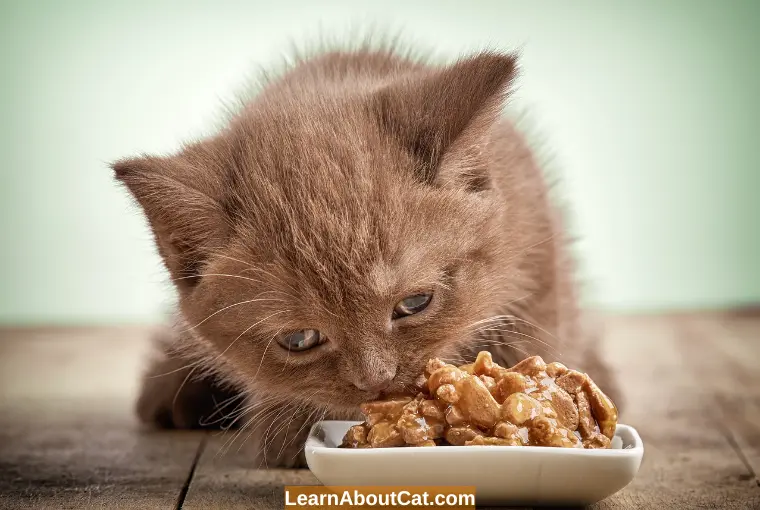
1. Meats
All cooked, lean meat is fine for your cats, such as beef, chicken, turkey, liver, and lamb. It is important to make sure that your cat’s meat is cooked thoroughly before giving it to them – never give your cat raw meat – and to remove all skin and bones.
2. Fish
It is widely known that cats love fish, and most types are actually safe for them to consume! The omega-3 fatty acids found in these fish may be beneficial for the health of cats for a variety of reasons, including arthritis and kidney disease. Fish should be cooked thoroughly and bones removed, just like meat, and raw fish should never be fed to your cat.
3. Vegetables
Vegetables aren’t normally a favorite of cats, so they may turn their noses up if offered. However, if your cat enjoys an odd veggie snack, it’s good for its health. Vegetables are high in vitamins, fibre, and water. There are a few vegetables that cats can eat safely, including carrots, cucumbers, steamed broccoli, peas and asparagus.
4. Fruits
Cats can also have issues with fruits, as some don’t like the texture or flavor, just like they do with vegetables. Cats can eat quite a few fruits that are safe if they have a sweet tooth for them.
The following are healthy fruit snacks that contain potassium, fibre, vitamins A and C, as well as fewer calories: blueberries, bananas, watermelon (seedless), peeled apples (deseeded), cantaloupe and pumpkins.
5. Whole Grains
Cats can eat whole grains such as oatmeal, brown rice, corn, and even couscous, all of which contain plenty of protein.
6. Eggs
When it comes to what cats can eat, you might be surprised to learn that eggs are one of the options! The healthy, protein-packed eggs are a good treat for cats (either scrambled or boiled) since they contain lots of amino acids. Cats shouldn’t be fed raw eggs, since salmonella can be transmitted to them like it does to humans.
Check Out: Can Cats Eat Hot Dogs?
Human Foods Are Not Meant for Cats
There are a number of foods that are toxic to cats, which is the main reason to discourage cats from eating “people’s food.” Humans enjoy it, and it is harmless for them. However, cats can die if they eat just a tiny bit of “people’s food.” Cat owners need to be aware of the everyday foods that cats can eat that can be dangerous and even deadly.
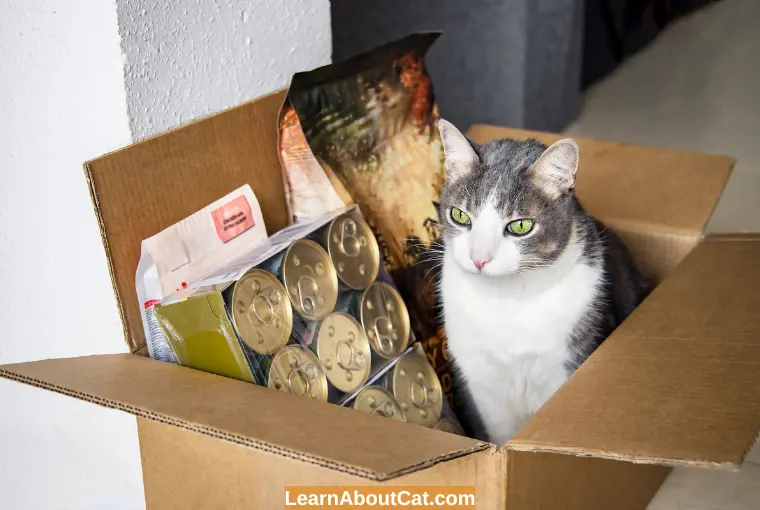
Foods That Are Toxic to Cats
1. Alcohol
Dogs who consume alcohol might have serious health problems, including vomiting, diarrhoea, breathing difficulties, comas, and even death.
2. Chocolate
Methylxanthines, such as theobromine and caffeine, are harmful to animals and can cause vomiting, diarrhoea, tremors, convulsions, and even death. Methylxanthines are present in varying amounts in different kinds of chocolate. Although cocoa powder is dangerous, white chocolate is the least dangerous.
3. Coffee
Coffee may have similar effects to those listed above since it contains the same methylxanthine caffeine that is present in chocolate.
4. Dairy Foods
Since many cats struggle to digest dairy owing to lactose intolerance properly, dairy products may irritate your cat’s stomach. The best course of action is to entirely avoid them, but you can ask your veterinarian whether a reward that doesn’t include lactose might be appropriate.
5. Yeast
Yeast-based dough has the ability to rise and give your cat an intestinal gas buildup. So, stomach bloating may occur. Yeast-produced alcohol also comes with a unique set of problems. However, it is believed that healthy cats may safely eat baked bread.
6. Citrus-Flavoured fruit
Lemons, limes, oranges, clementines, and grapefruits are examples of citrus fruits with citric acid and essential oils that may cause problems for cats. It is advisable to avoid all stems, leaves, peels, fruit, and seeds. In small doses, gastric discomfort occurs.
7. Grapes and Raisins
Although the exact reason why grapes and raisins are hazardous to animals is still unknown, there is evidence that feeding them to cats (and dogs, too!) can induce renal failure.
8. Few Vegetables and Herbs
Some vegetables are OK for cats to eat, but they shouldn’t eat things like onions, garlic, leeks, scallions, shallots, or chives since they might upset their stomachs and perhaps harm their red blood cells. Additionally, garlic bread that includes specific herbs and vegetables should be avoided.
9. Coconut Milk
Larger quantities of fresh coconut milk and flesh can upset a pet’s stomach, but smaller amounts are unlikely to cause any harm. While coconut water contains too much potassium for cats, some cat skin disorders may benefit from the usage of coconut oil. Before using this supplement or feeding it to your cat, talk to your veterinarian.
10. Raw or Undercooked Meat
Meat that is undercooked or uncooked may contain bacteria like Salmonella and E. coli, similar to raw eggs. The Clinical Nutrition Service states that dogs and cats fed raw meat diets usually display digestive problems, most frequently diarrhoea.
11. Uncooked eggs
In uncooked eggs, salmonella bacteria could be present. You are infected if you have diarrhoea, vomiting, or a fever. Additionally, the vitamin biotin, which is essential for the well-being of cats’ skin and fur, cannot be absorbed by them due to the avidin present in raw eggs.
12. Nuts
Macadamia nuts are harmful to animals, similar to grapes; however, it is unknown exactly how. Among other nut species, almonds, pecans, and walnuts are high in oils and fats that might irritate a cat’s stomach and perhaps result in pancreatitis.
13. Salt
In large doses, salt and salty foods can cause dogs to vomit, have diarrhoea, tremble, have seizures, and even pass away.
14. Xylitol
Animals may experience nausea, exhaustion, and liver failure from xylitol, a common sweetener found in packaged goods like gum and confections.
Check Out: Can Cats Have Whipped Cream?
How To Stop Cats From Eating Human Food?
Your cat’s quality of life and chances of survival depend on the type of food she consumes. By preventing her from having access to toxic or dangerous goods and by making sure she consumes a balanced diet, you are helping her preserve her health.
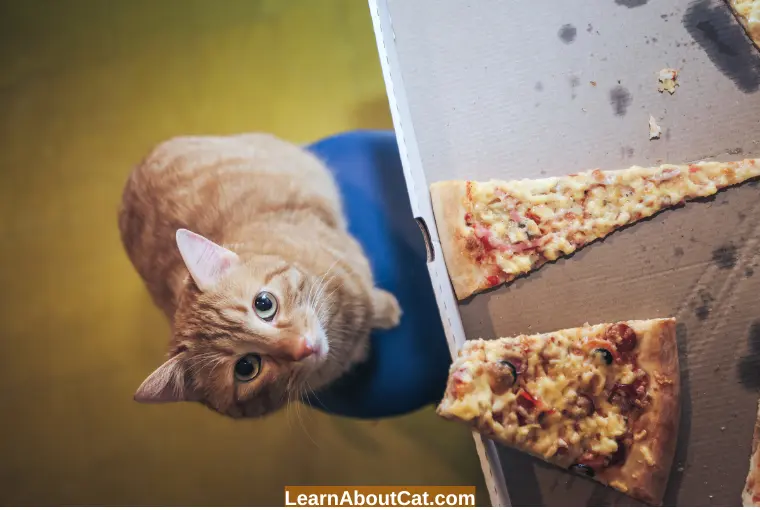
Here are some quick guidelines to help you keep your cat from consuming harmful or lethal foods:
- For an inquisitive cat, installing cat-proof locks on cupboards can be required.
- Keep your cat off the counter when you’re eating or cooking.
- Don’t let her consume any table scraps.
- It is especially important to practise more mindfulness over the holidays. Numerous tempting human foods that can harm or even upset your cat’s stomach are probably close by.
- While some of these foods would just make your cat somewhat uncomfortable, others can harm her health. If unsure, ask your veterinarian for guidance.
Human Foods that should be given To Cats With Caution

1. Potatoes
Numerous cat food manufacturers even include potatoes in their products since they are well-liked by cats. Potassium, vitamins B and C, and other minerals are abundant in potatoes. But the toxin solanine present in raw potatoes can be exceedingly hazardous to your feline friend.
The good news is that you may feed potatoes that have been peeled and cooked (either boiled or baked) in moderation since solanine disappears after cooking. Avoid offering fried potatoes because of their high-fat content, and be sure to provide them unseasoned.
2. Avocados
The avocado’s pit, peel, and leaves contain avocado, which can poison certain animals such as rabbits, goats, and birds.
It may be advisable to err on the side of caution and restrict how frequently you serve avocados to your cat, even if there is no conclusive evidence that they are poisonous to them.
Although the flesh of an avocado contains a lot of fat, it may still be eaten in very small amounts.
3. Peaches
A small bit of peeled fruit can be fed to a newborn without any danger, but a big amount could cause diarrhoea and upset the stomach because of the fruit’s high sugar content and difficulty in digesting. Since the pit offers a significant risk and has traces of cyanide in it, it should be eliminated.
4. Tomatoes
Solanine, which is present in tomato skin and leaves, is toxic to cats. Before putting tomatoes in your cat’s diet, make sure they are thoroughly peeled and ripe.
5. Corn
Although maize is not toxic to cats, it also doesn’t actually offer any nutritional advantages to them. While consuming a few corn kernels won’t harm your cat, frequent consumption might be detrimental to their stomach and digestive system. C
hoose maize that has been prepared simply—without any flavours, sauces, or oils—if you plan to offer it to your pet.
6. Catch tuna
Cats may safely eat canned tuna, even though it can have more unsaturated fats than tuna intended for humans. As a treat or snack, one tablespoon or less of it could be OK, but feeding your cat a lot of tuna on a daily basis could be harmful.
7. Peanut butter
Giving extremely small quantities of peanut butter is safe. Despite having a lot of protein, peanut butter also has a lot of lipids, which can lead to diabetes and obesity, as well as carbs, which cats find challenging to digest.
Furthermore, due to its sticky texture, it could present a choking risk for your feline companion. It is also possible that cats have a peanut allergy that could be fatal.
8. Bread
Although cats occasionally eat a very small amount of bread without experiencing any adverse effects, they shouldn’t replace their usual cat food diet with bread because it offers very little nutritional value to them.
9. Broccoli
Despite being a fantastic source of vitamins and minerals, broccoli can cause constipation. You can occasionally give your cat very small amounts of unseasoned, boiling food.
Never offer spinach to a pet that has kidney or digestive system problems. This is due to the fact that it includes calcium oxalates, which might trigger the development of urinary tract stones.
List of Human Foods That Cats Can and Cannot Eat
The following is a list of typical human foods that cats can and cannot eat. I explain in more detail below whether or not each item is suitable for your cat. However, use the list below as a reference if you want a rapid response:
Human Foods That Are Safe for Cats
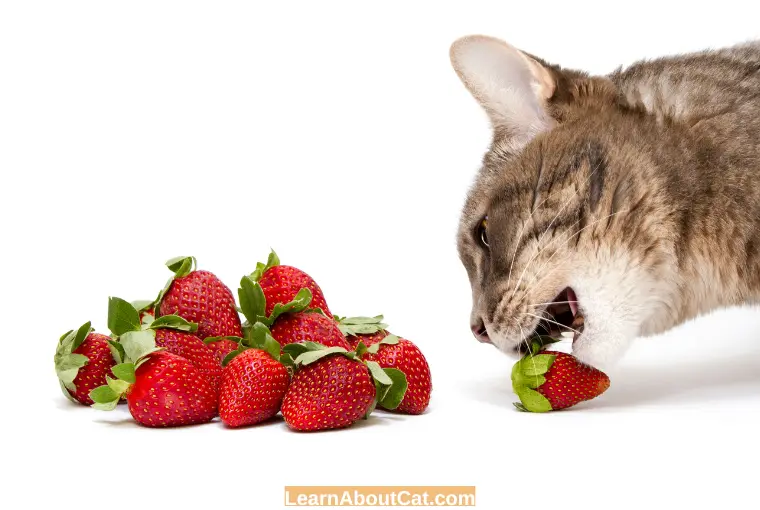
What Fruit Can Cats Eat?
- Blueberries
- Cranberries
- Pineapple
- Apple
- Pear
- Peach
- Strawberries
- Banana
- Watermelon
- Raspberries
- Pumpkin
What Meat Can Cats Eat?
- Tuna Fish
- Oatmeal
- An egg
- Turkey
- Salmon
- Fish Oil
What Vegetables Can Cats Eat?
- Shrimp
- Carrot
- Peas
- Broccoli
- Spinach
- Legumes
- Potatoes
- Celery
- Lettuce
- Cucumber Tomatoes
- Cut up or cook cauliflower in the boiling or cooking process.
What Grains Can Cats Eat?
- Bread
- Rice
- Bacon with ham
Find Out: Can Humans Eat Cat Food?
Human Foods That Are Poisonous to Cats
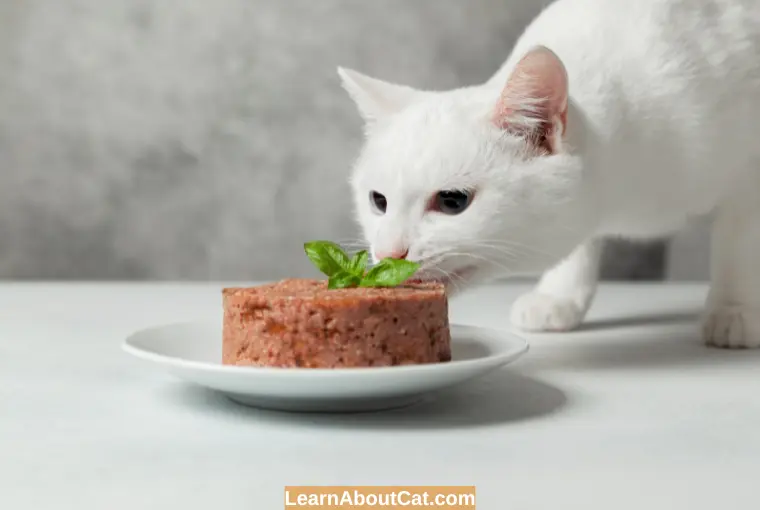
These foods are Inedible to cats
- Cherries
- Plums
- Grapes
- Raisins Chips
- Orange
- Citrus
- Dairy and Milk
- Yeast Dough
- Cheese
- Cold dessert (ice cream)
- Chocolate, Coffee and Caffeine
- Raw fish, raw meat, raw poultry, and raw eggs.
- Meat with fish, poultry, or meat flavours
- Salt and Salty Snack Foods
- Alcohol
- Coconut milk
- Onion
- Garlic
- Seeds
- Chives
- Nuts(macadamia, almonds, pecans, and walnuts)
- Xylitol
Because they are acidic and contain psoralens, limonene, and linalool, citrus fruits are toxic to cats.
Also Read: Can Cats Eat Cake?
Frequently Asked Questions
What to do If your cat has been poisoned?
Immediately call your veterinarian or the ASPCA National Animal Poison Control Center at 1-888-426-4435 or the Pet Poison Helpline at 1-800-213-6680. If you have any information about what they ate or what symptoms you are experiencing, please share it.
What human food is good for cats?
There are some “human” foods that are not harmful to your cat, even though they are not the best choice for your cat: thoroughly cooked lean meats without onion or garlic seasoning, fish without bones, whole grains, fruits, and vegetables.
What human foods are poisonous to cats?
The Clinical Nutrition Service states that a number of foods meant for people are toxic to cats and should never be offered to them. Many foods haven’t been exposed to peer-reviewed studies to see how toxic they are, so the ASPCA hasn’t included them all on its extensive list of cat-safe human meals.
Why do cats like human food?
Human food offers more variety and tastes better than what cats should be eating, so they eat it because it is more enjoyable than their usual food.
Wrap Up!
Human food cannot satiate all of your cat’s needs. Knowing what could be harmful to your cat and what might be beneficial is also crucial. Raw food is another option, but I still don’t feel especially drawn to it because of the potential dangers.
We can, in short, make a vast range of combinations for our furry little companions. We may make tasty meals while taking into account our veterinarian’s suggestions and her dietary preferences.
Related Posts:
- Can Cats Eat Honeydew?
- Can Cats Eat Goldfish Crackers?
- Can Cats Eat Oysters?
- Cats Eat Gum?
- Can Cats Eat Flour?
- Can Cats Eat Beef Jerky?
- Can Cats Eat Cantaloupe?
- Can Cats Eat Cooked Chicken Bones?
- Can I Feed My Cat Chicken Every Day?
- Can Cats Eat Chicken Broth?
- Can Cats Eat Goji Berries?
- Can Cats Eat Hot Cheetos?
Who is Isabella?
My name is Isabella, and I am a dedicated and knowledgeable cat enthusiast. With years of experience caring for cats and a deep love for felines, I made a mission to help other cat lovers navigate the challenges of cat ownership.

